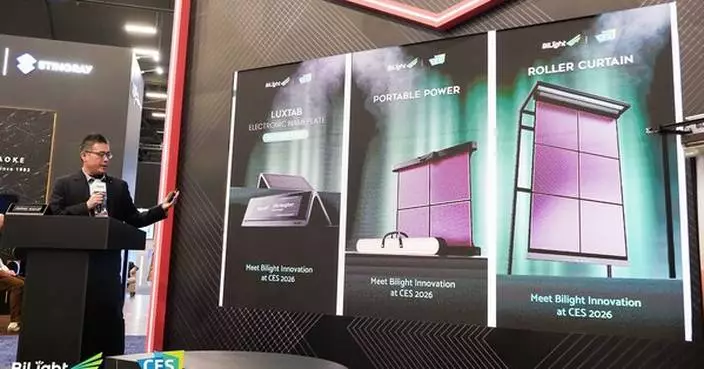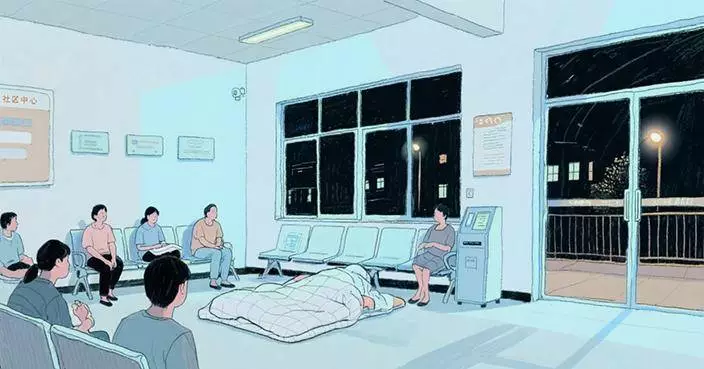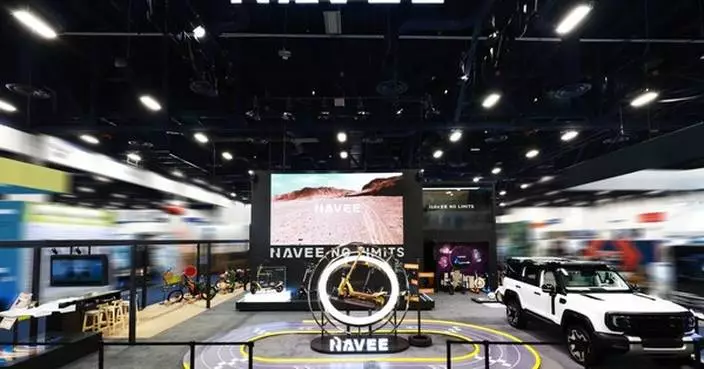Feature · News

U.S. quits 66 int'l organizations under Trump's order

Visa-free foreign entries to Nanjing grow 212 percent

Chinese navy hospital ship drills medical rescue in Atlantic waters

Chinese tech innovations shine at CES 2026 in Las Vegas

China's January box office surpasses 1 bln yuan

Chinese, US business leaders welcome closer cooperation at CES 2026

Chinese premier stresses coordination of fiscal, financial policies to boost demand

BP China Insight: Danish MP: America's targeting of Greenland will only push Europe towards China

US intercepts fifth sanctioned tanker as it exerts control over Venezuelan oil distribution

Northeast China braves cold wave, snow storms

The aftermath of the fatal shooting of Renee Good by an ICE agent in photos

V Mart Opens at Victoria Park, Showcasing Cultural Arts and Pet-Friendly Events for Chinese New Year

Iranian envoy accuses U.S. of interfering in Iran's internal affairs in letter to UN Security Council

Ski resorts receive growing tourists in China's Xinjiang, Guizhou

Russian ambassador slams illegal US oil embargo on Venezuela

Irish Taoiseach calls for enhancing economic, cultural cooperation with China
Chinese premier stresses coordination of fiscal, financial policies to boost demand

BP China Insight: Danish MP: America's targeting of Greenland will only push Europe towards China

US intercepts fifth sanctioned tanker as it exerts control over Venezuelan oil distribution
Northeast China braves cold wave, snow storms
U.S. quits 66 int'l organizations under Trump's order
Visa-free foreign entries to Nanjing grow 212 percent
Chinese navy hospital ship drills medical rescue in Atlantic waters
Chinese tech innovations shine at CES 2026 in Las Vegas
China's January box office surpasses 1 bln yuan
Chinese, US business leaders welcome closer cooperation at CES 2026

The aftermath of the fatal shooting of Renee Good by an ICE agent in photos

V Mart Opens at Victoria Park, Showcasing Cultural Arts and Pet-Friendly Events for Chinese New Year
Iranian envoy accuses U.S. of interfering in Iran's internal affairs in letter to UN Security Council
Ski resorts receive growing tourists in China's Xinjiang, Guizhou
Russian ambassador slams illegal US oil embargo on Venezuela
Irish Taoiseach calls for enhancing economic, cultural cooperation with China
Feature·Bloggers

【What Say You?】Trump’s “Maduro Grab” Gets a Glossy Spin by the Usual Suspects

【What Say You?】Trump's Judicial Theater: Maduro's Fate Already Sealed

【Deep Throat】Trump's Venezuelan Oil Grab: Big Oil Not Playing Along?

The Most Laughable Lie of the New Year: Jimmy Lai's "Grave Illness" Falls Apart Under Five Hard Facts

【What Say You?】Black Riots “comrades” Thought Ukraine Was Another “Resistance”—Then the Contract Hit

【Bastille Commentary】Green Nails? The Lie No Lawyer Would Touch

Anti-ICE protesters assemble across the US after shootings in Minneapolis and Portland, Oregon
- Anti-ICE nationwide protests in photos
- Protests in Iran reach the 2-week mark as authorities intensify crackdown on demonstrators
- Trump pushes a 1-year, 10% cap on credit card interest rates and banks balk
- Trump signs executive order meant to protect the money from Venezuelan oil
- Veteran actor T.K. Carter, known for 'The Thing' and 'Punky Brewster,' dies at 69
- Supporters press for a DC memorial to Thomas Paine, whose writings helped fuel the Revolutionary War
- A week in photos from Venezuela after U.S. strike removed its president
- As protests rage, Iran pulls the plug on contact with the world
- Video shows armed men beating a Palestinian in the Israeli-occupied West Bank
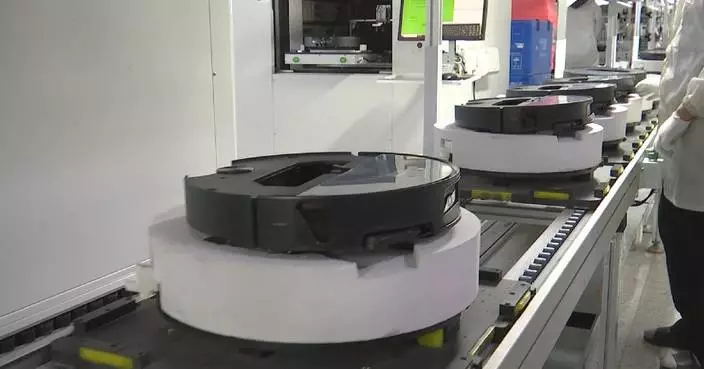
Chinese robot vacuum brands gain strong global traction
- Internet services partially resume, sufficient daily supplies available in Iran's Tehran
- Pack of wolves spotted after snowfall in Xinjiang's nature reserve
- Thursday's Israeli airstrikes across Gaza kill at least 14
- Lesotho looks to deeper cooperation ahead of Chinese FM's visit
- Multiple nations, organizations condemn U.S. military actions against Venezuela
- Southern Transitional Council denies its dissolution
- Residents recall horrific moments in Philippines landfill collapse as rescue efforts continue
- Syrian Army conducts security operation in Aleppo amid ceasefire breakdown
- Tanzanian President Hassan meets Chinese FM Wang Yi
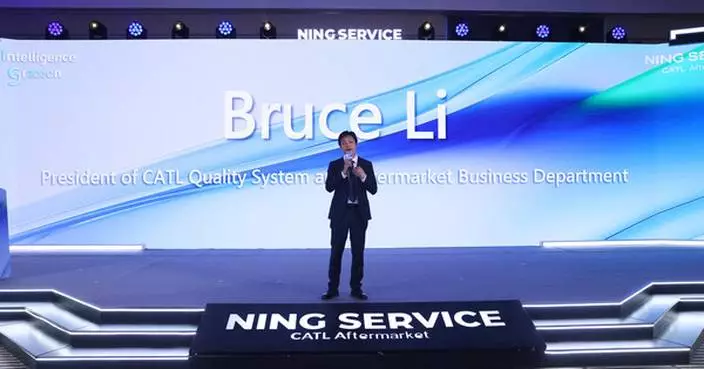
CATL Opens Middle East's Largest New Energy Aftermarket Facility in Riyadh
- SeaVerse Launches World's First AI Native Platform, "All in AI Native" Leads the Forward-Looking Revolution in AI Creation
- Etiqa’s Project Firefly Reinforces Mangrove Ecosystem in Sungai Panjang in Collaboration with Malaysian Nature Society
- BiLight Dazzles CES 2026: Flexible Perovskite PV Leads Green Tech Wave, Forges Global Partnerships
- USA Truck Returns to Private Ownership with Arkansas-Based UTAC, LLC, Positioned for Accelerated Growth
- GM hit with $6 billion in charges as EV incentives cut and emissions standards fade
- Wall Street rises to records after the unemployment rate improves
- ApexVision Debuts at CES 2026: Guide Sensmart Ushers in the Ultra-Clarity Era of Thermal Imaging
- Advance Auto Parts Names OSRAM Sylvania Inc. Global 2025 Vendor Partner of the Year
- TCL Earns Multiple CES 2026 Awards for Breakthrough Innovations Across TV, Mobile, and Smart Home Categories

Doctors say changes to US vaccine recommendations are confusing parents and could harm kids
- Strength training is crucial after menopause. How to make the most of your workouts
- Meta lines up massive supply of nuclear power to energize AI data centers
- From climbing vacuums to cyber pets: Some highlights of CES 2026
- Musk's Grok chatbot restricts image generation after global backlash to sexualized deepfakes
- Some flu measures decline, but it's not clear this severe season has peaked
- NASA, in a rare move, cuts space station mission short after an astronaut's medical issue
- 'Worst in Show' CES products include AI refrigerators, AI companions and AI doorbells
- How Americans feel about crowdfunding websites like GoFundMe, according to an AP-NORC poll
- Gmail adds new AI features, turning it into a personal assistant

Hollywood couple Meagan Good and Jonathan Majors gain Guinean citizenship
- Actor Timothy Busfield accused of child sex abuse in New Mexico
- Hollywood stars gather for an all-winners celebration at the American Film Institute Awards
- Laura Dave's sequel to 'The Last Thing He Told Me' reveals all
- Judge dismisses Salt-N-Pepa's lawsuit to reclaim master recordings from Universal Music Group
- Rapper Fetty Wap released from prison early in drug trafficking case
- David Bowie's childhood home in London is set to open to the public next year
- Will K-pop earn its first Grammy in 2026? Maybe, but it's complicated
- Photos show Cirque du Soleil rehearsing for upcoming show 'Ovo,' on the life cycle of insects
- Sarah Jessica Parker gets Golden Globes' Carol Burnett Award and Helen Mirren gets DeMille prize

Golden Knights goalie Carter Hart is out week to week with a lower-body injury
- 6th-tier Macclesfield upsets FA Cup holder Crystal Palace in huge shock. Man City scores 10
- Stuttgart sweeps aside Leverkusen as snow hampers the Bundesliga
- With Ryan in place, Falcons begin coach search by interviewing Dolphins' Weaver and Seahawks' Kubiak
- Honor Huff and Brenen Lorient help West Virginia beat No. 22 Kansas 86-75
- No. 20 Louisville beats Boston College 75-62 as ex-G League player London Johnson is made available
- Jamarques Lawrence scores 27 to help No. 10 Nebraska overcome 16-point deficit to beat Indiana 83-77
- Boogie Fland delivers his best game at Florida and leads the way against No. 21 Tennessee, 91-67
- Rockies acquire outfielder Jake McCarthy from the Diamondbacks for a minor league pitcher
- The Hoosiers' dominant CFP run could put them in the mix for best of all time... pending a title

Nestlé Hong Kong Recalls Additional Infant Formula Over Bacillus Cereus Contamination Concerns
- Woman Sentenced to Six Months for Smuggling Duty-Not-Paid Cigarettes in Hong Kong
- 18 Temporary Cold Shelters Opened Amid Severe Weather for Those in Need
- CHP Urges Vulnerable Groups to Take Precautions Against Cold Weather Health Risks
- Hong Kong Film Festival Launches in Copenhagen, Showcasing Local Cinema and Cultural Exchange
- Health Authorities Investigate Food Poisoning Linked to School Lunches Affecting 39 Students in Two Primary Schools
- Enhanced medical fee waivers benefit over 49,000 patients, expanding support for low-income families and critical cases
- Immigration Department Arrests 12 Illegal Workers in Territory-wide Operations Contribute, Twilight, and Flabbergast
- FSD Implements New Regulations for Enhanced Fire Safety Transparency and Management
- A Fire Broke out in Lam Tin Estate, Suspected to be Caused by a Short Circuit

Dutch student urges global empathy to confront war, poverty
- 2026 Beijing Book Fair highlights cultural, creative integration in publishing
- Snow disrupts traffic in Liaoning, Shanxi
- China-ROK ties deepen with expanded cooperation: official
- China’s AS700 manned airship completes first commercial flight
- Southwest China's Chongqing records more than 2.48 million border crossings in 2025
- China’s Antarctic Qinling Station runs smoothly with homegrown desalination, renewable energy systems
- More digital techs like AI highlight 2026 Beijing Book Fair
- Italian figures condemn US intervention in Venezuela
- China's 2026 trade-in policy fuels strong consumer spending
Category · News

Anti-ICE protesters assemble across the US after shootings in Minneapolis and Portland, Oregon

Anti-ICE nationwide protests in photos

Golden Knights goalie Carter Hart is out week to week with a lower-body injury

Protests in Iran reach the 2-week mark as authorities intensify crackdown on demonstrators

Trump pushes a 1-year, 10% cap on credit card interest rates and banks balk

Trump signs executive order meant to protect the money from Venezuelan oil

6th-tier Macclesfield upsets FA Cup holder Crystal Palace in huge shock. Man City scores 10

CATL Opens Middle East's Largest New Energy Aftermarket Facility in Riyadh

Veteran actor T.K. Carter, known for 'The Thing' and 'Punky Brewster,' dies at 69
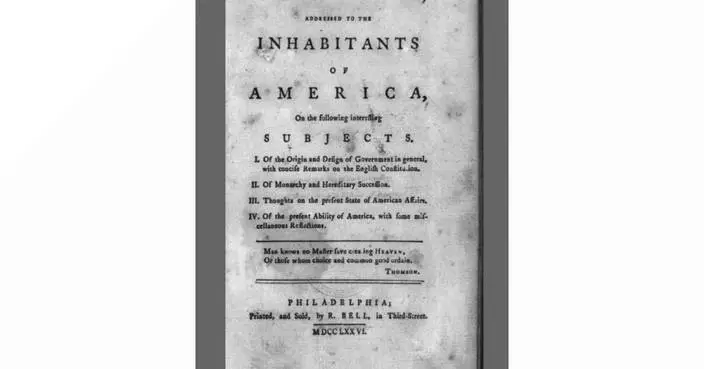
Supporters press for a DC memorial to Thomas Paine, whose writings helped fuel the Revolutionary War

Stuttgart sweeps aside Leverkusen as snow hampers the Bundesliga

With Ryan in place, Falcons begin coach search by interviewing Dolphins' Weaver and Seahawks' Kubiak

Honor Huff and Brenen Lorient help West Virginia beat No. 22 Kansas 86-75

No. 20 Louisville beats Boston College 75-62 as ex-G League player London Johnson is made available

Jamarques Lawrence scores 27 to help No. 10 Nebraska overcome 16-point deficit to beat Indiana 83-77

Boogie Fland delivers his best game at Florida and leads the way against No. 21 Tennessee, 91-67

Rockies acquire outfielder Jake McCarthy from the Diamondbacks for a minor league pitcher
Chinese robot vacuum brands gain strong global traction

The Hoosiers' dominant CFP run could put them in the mix for best of all time... pending a title

A week in photos from Venezuela after U.S. strike removed its president

As protests rage, Iran pulls the plug on contact with the world

Osimhen sends Nigeria to Africa Cup semifinals with win over Algeria

Video shows armed men beating a Palestinian in the Israeli-occupied West Bank

Fischnaller, Greiner move closer to officially locking up US Olympic luge berths

Syrian security forces enter Aleppo neighborhood after clashes with Kurdish fighters

Internet services partially resume, sufficient daily supplies available in Iran's Tehran

Washington Commanders are promoting David Blough to offensive coordinator

Cam Heyward's play remains ageless at 36. The Steelers captain still knows the clock is ticking

Odermatt wins World Cup giant slalom at Adelboden for record fifth straight year
Pack of wolves spotted after snowfall in Xinjiang's nature reserve

Former quarterback Matt Ryan to lead search for Falcons' new coach and GM as president of football

Lindsey Vonn impresses again winning World Cup downhill for 2nd victory of Olympic season

Oregon QB Dante Moore is undecided on the NFL draft or another year with the Ducks

Ukrainian drones set fire to Russian oil depot after Moscow launches new hypersonic missile
Thursday's Israeli airstrikes across Gaza kill at least 14

Stafford gets first nod for AP All-Pro. Garrett, Nacua and Smith-Njigba are unanimous choices
Lesotho looks to deeper cooperation ahead of Chinese FM's visit

Nestlé Hong Kong Recalls Additional Infant Formula Over Bacillus Cereus Contamination Concerns

Morocco coach says claims of Africa Cup refereeing bias are from foes 'who want to see us fall'
Multiple nations, organizations condemn U.S. military actions against Venezuela
Southern Transitional Council denies its dissolution
Residents recall horrific moments in Philippines landfill collapse as rescue efforts continue

'Team Avalanche' unites cross-country skiing Olympic hopefuls from small countries
Syrian Army conducts security operation in Aleppo amid ceasefire breakdown

Poland beats US in mixed doubles decider to reach United Cup final against Switzerland

Doctors say changes to US vaccine recommendations are confusing parents and could harm kids

Strength training is crucial after menopause. How to make the most of your workouts

Sabalenka advances to the Brisbane International final by beating Muchová

SeaVerse Launches World's First AI Native Platform, "All in AI Native" Leads the Forward-Looking Revolution in AI Creation
Tanzanian President Hassan meets Chinese FM Wang Yi

Russia uses its new ballistic missile in a major attack on Ukraine and a warning to West

Down 50 pounds, Liam Coen’s personal transformation mirrors Jacksonville’s dramatic turnaround

It's Indiana and Miami in a college-football title matchup that once seemed impossible

Hollywood couple Meagan Good and Jonathan Majors gain Guinean citizenship
Dutch student urges global empathy to confront war, poverty

Photos show opposition leader Bobi Wine campaigning ahead of Uganda's presidential election
2026 Beijing Book Fair highlights cultural, creative integration in publishing
China-ROK ties deepen with expanded cooperation: official
Snow disrupts traffic in Liaoning, Shanxi
China’s AS700 manned airship completes first commercial flight
Southwest China's Chongqing records more than 2.48 million border crossings in 2025
China’s Antarctic Qinling Station runs smoothly with homegrown desalination, renewable energy systems
More digital techs like AI highlight 2026 Beijing Book Fair
Italian figures condemn US intervention in Venezuela
ICE shooting sparks Minneapolis protests amid rising community anger
China's 2026 trade-in policy fuels strong consumer spending
Wild panda mother, cub captured roaming in Sichuan forest
Iran's Khamenei urges national unity
China Media Group unveils top 10 AI trends for 2026
Chinese exhibitors showcase integrated technological ecosystems at U.S. consumer show
Diverse offerings boost weekend consumption across China
Ireland's PM looks to steer EU-China relations toward sustainable trade framework
China's export controls to put broader economic pressure on Japan: expert
Irish prime minister hopes to further facilitate people-to-people exchanges with China
Irish Taoiseach praises pace of Chinese modernization
Irish prime minister reiterates firm adherence to one-China policy
Heavy snow hits Moscow

Dakar Rally moves through sweeping desert landscapes, in photos
Chinese robot vacuums debut at CES 2026 with stair-climbing, flying features

North Korea vows response as it accuses the South of flying drones across the border
China eyes greater advances in embodied intelligence, robots
Multilateralism key to reducing conflicts: Irish prime minister
Poles warn U.S. remarks on Greenland threaten sovereignty, world order

VR headsets are 'hope machines' inside California prisons, offering escape and practical experience








